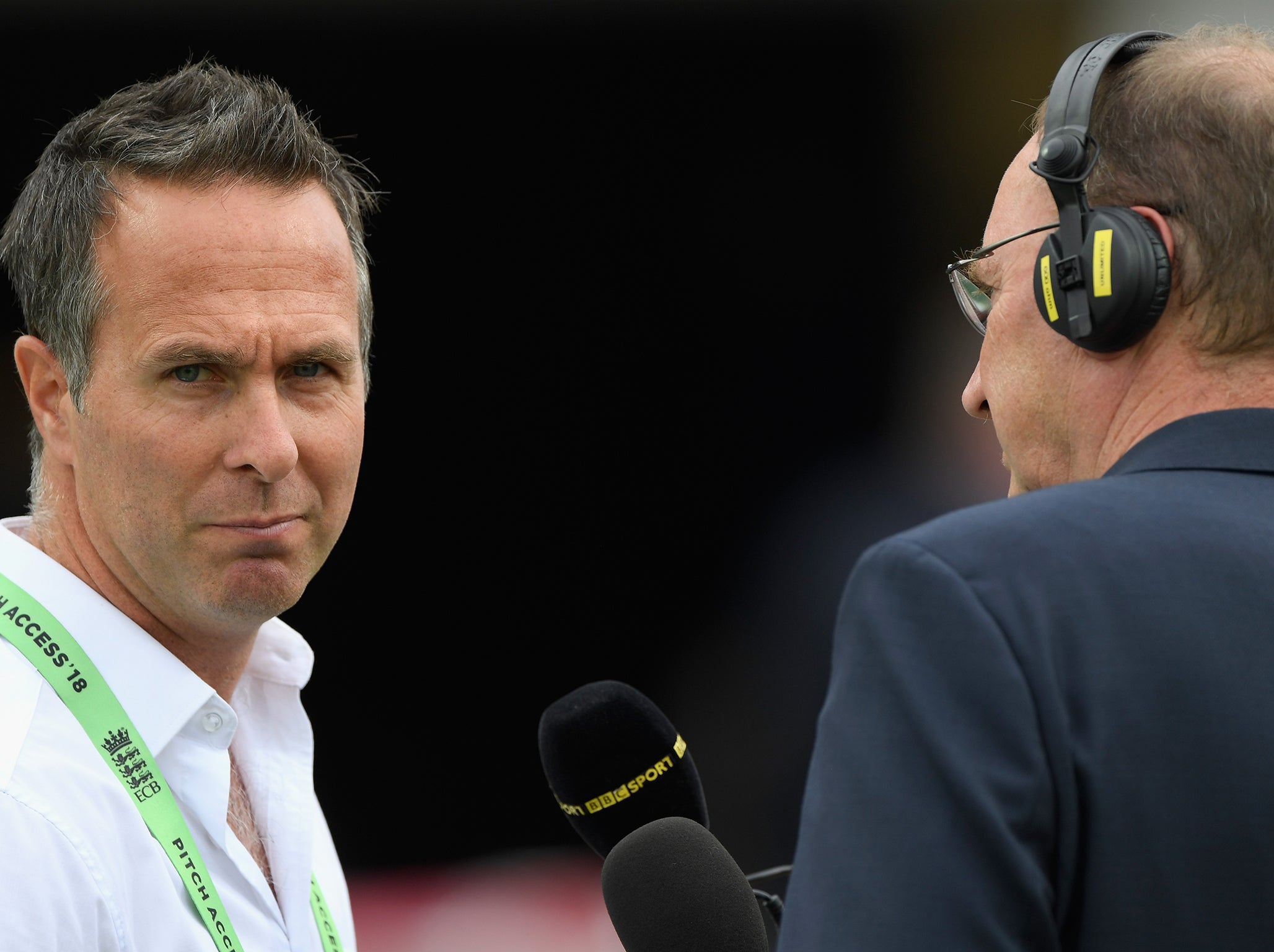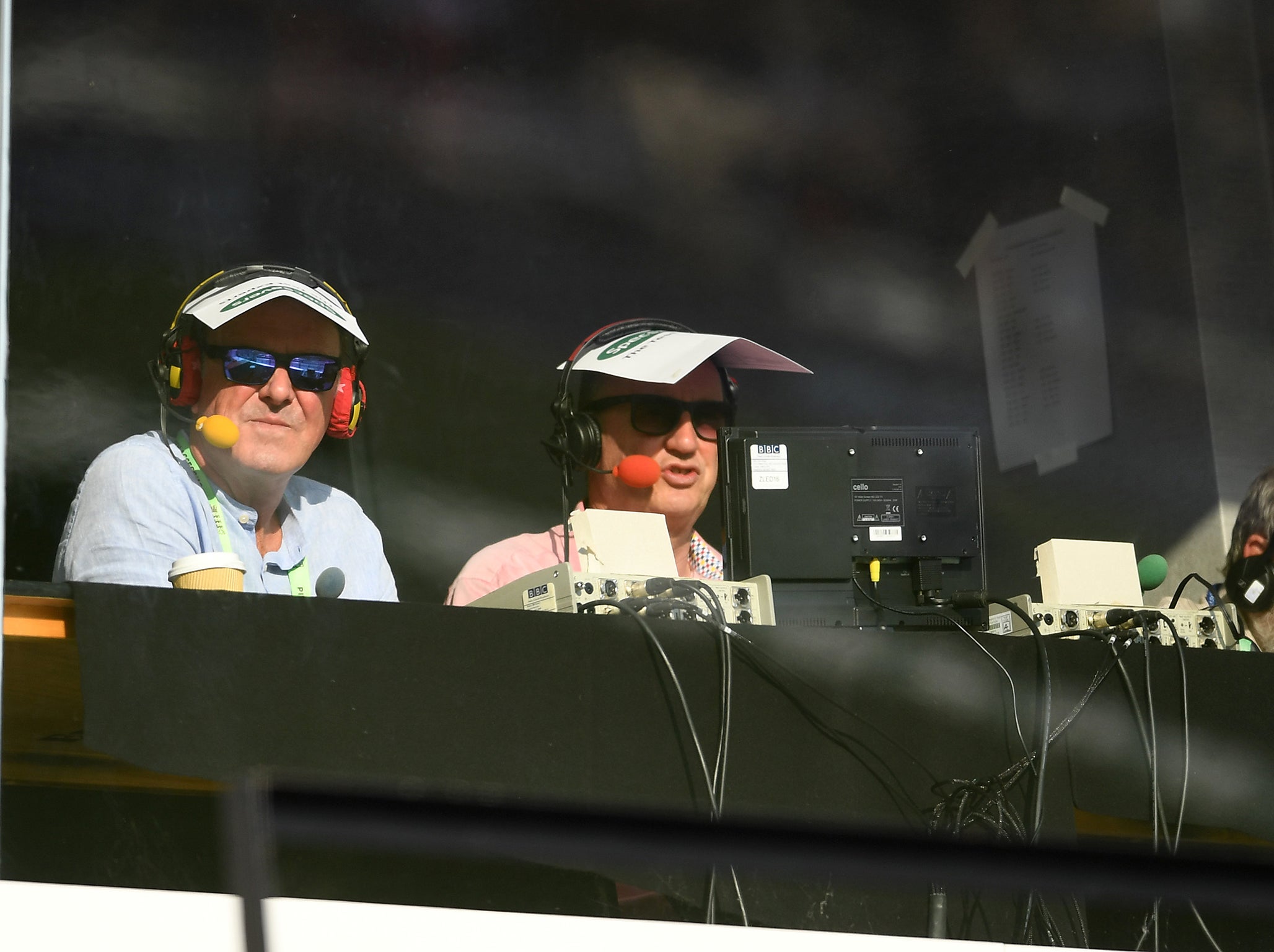The Cricket Social makes a promising debut by boldly making the sport itself utterly incidental
The Cricket Social is, essentially, Test Match Special without the live cricket, which, given its fascination with pigeons and cakes and buses was perhaps always the endgame

Your support helps us to tell the story
From reproductive rights to climate change to Big Tech, The Independent is on the ground when the story is developing. Whether it's investigating the financials of Elon Musk's pro-Trump PAC or producing our latest documentary, 'The A Word', which shines a light on the American women fighting for reproductive rights, we know how important it is to parse out the facts from the messaging.
At such a critical moment in US history, we need reporters on the ground. Your donation allows us to keep sending journalists to speak to both sides of the story.
The Independent is trusted by Americans across the entire political spectrum. And unlike many other quality news outlets, we choose not to lock Americans out of our reporting and analysis with paywalls. We believe quality journalism should be available to everyone, paid for by those who can afford it.
Your support makes all the difference.When the rain came with England on a promising 92/2 from 15 overs, white-ball and red-ball captains together and the game fascinatingly poised, it made no immediately discernible difference to The Cricket Social, the BBC’s new cricket commentary show that isn’t really about cricket and doesn’t feature any commentary.
Having lost out to talkSPORT for the broadcast rights to England’s tour of Sri Lanka, the BBC racked their brains and came up with an ingenious way to keep Aggers and co. on the air.
Instead of the usual Test Match Special from the ground, the BBC commentary team would instead be holed up in a studio in the UK broadcasting on the internet from Sky TV pictures. It’s a concept that might sound familiar to some, and here lies a story.
The Cricket Social is the brainchild of Test Match Special commentator Daniel Norcross, and bears more than a passing resemblance to his earlier creation Test Match Sofa, an alternative cricket commentary service featuring robust language and cans of Stella. When the Sofa began broadcasting on the internet despite possessing no broadcast rights, the TMS old guard were so enraged that Christopher Martin-Jenkins declared the newcomers “predators” who should be “swept offline”. When the Sofa linked up with The Cricketer, Jonathan Agnew harrumphed that he would never read the magazine again.
If you can’t beat them…
Phil Tufnell suggested getting some beers in at 9.50am. Agnew was reading out tweets. One of the guests was running late. All that was missing were some jingles and an actual sofa.
Here’s the thing, though. It works. This was TMS without the live cricket, which, given its fascination with pigeons and cakes and buses was perhaps always the endgame. While the truncated action means only tentative conclusions can be drawn about how it works across a full day’s play, this was a hugely encouraging start. The casual tone was established early, with a smartly-judged early effort to own the situation. There was no attempt to conceal that the team were broadcasting from Salford not Dambulla.
Tufnell and Michael Vaughan were in their element, ideally suited to the loose format. Tufnell wanted some cans. Vaughan set his stall out with an early use of the word “bugger”. They and a mischievous Ebony Rainford-Brent best grasped the fundamental ‘Sofaness’ of the enterprise, allowing the conversation to meander freely around the nominal subject matter of a one-day international between Sri Lanka and England.

Agnew was slower to grasp the concept, but warmed to it. Having spent the first few overs trying to keep people bang up to date with the score, he was soon sufficiently on board with the format that England’s first wicket went unreported until a lengthy discussion of his Leicestershire Deputy Lieutenant’s uniform had been suitably concluded. This is not a criticism.
If you want ball-by-ball commentary and detail, you won’t find it here. As well as offering something different to the more traditional commentary available elsewhere, this brings another benefit. While some people inexplicably enjoy watching the television coverage and also having the action described to them in full, numbing radiophonic detail, here is an audio service that really can be combined with TV. So infrequently do Agnew, Vaughan or Tufnell refer directly to actual live events there is not even the need to fiddle about syncing the sound to the pictures. This worked equally when I switched the TV over to Pakistan v Australia as the rain fell.
With the actual cricket incidental, Vaughan was able, for example, to spend a good 10 minutes on Jason Roy’s change of bat sponsor, while when talk somehow found its way to an anecdote about Eddie Hemmings, listeners were informed that his autobiography was available from a well-known online bookseller for 1p (plus postage). Lightweight fluff it may have been, but this does look an inspired way to make use of the BBC’s roster of talent during a fallow winter.
The weak link was Simon Hughes, whose Buzz Killington, schoolmasterly tone and desire for structure robbed the show of its crucial conversational flow. He even shoehorned in a joke that was a) terrible and b) about golf. A step too far even in this relaxed setting.
Filling time with a repeat of this week’s Tuffers and Vaughan show, helmed by the light touch of Mark Chapman, only served to further highlight Hughes’ shortcomings.
Hughes’ major contribution was an inability to pronounce Vithushan Ehantharajah, a man who sounds exactly like Andrew Strauss and who should have a whole show where he does nothing but correctly pronounce his own name over and over for two hours. He was underused here, as was comedian and stats man Andy Zaltzman.

Yet things only really flagged when Tufnell – undoubtedly the breakout star of this first outing – had to leave to record a few episodes of A Question of Sport. Banter-based sports quizzing’s gain was experimental internet cricket whimsy’s loss.
The centrepiece of the show, an interview with a late-running Shane Warne, promised more titillation than it delivered despite Agnew mentioning, as he put it, “the sex word”.
After 15 minutes of chat about his book and the Gatting Ball and his off-field exploits, Warne stood up to leave. “Oh, by the way,” he said as an afterthought on his way out of the door. “What’s the score over there?” He gets it.
Join our commenting forum
Join thought-provoking conversations, follow other Independent readers and see their replies
0Comments